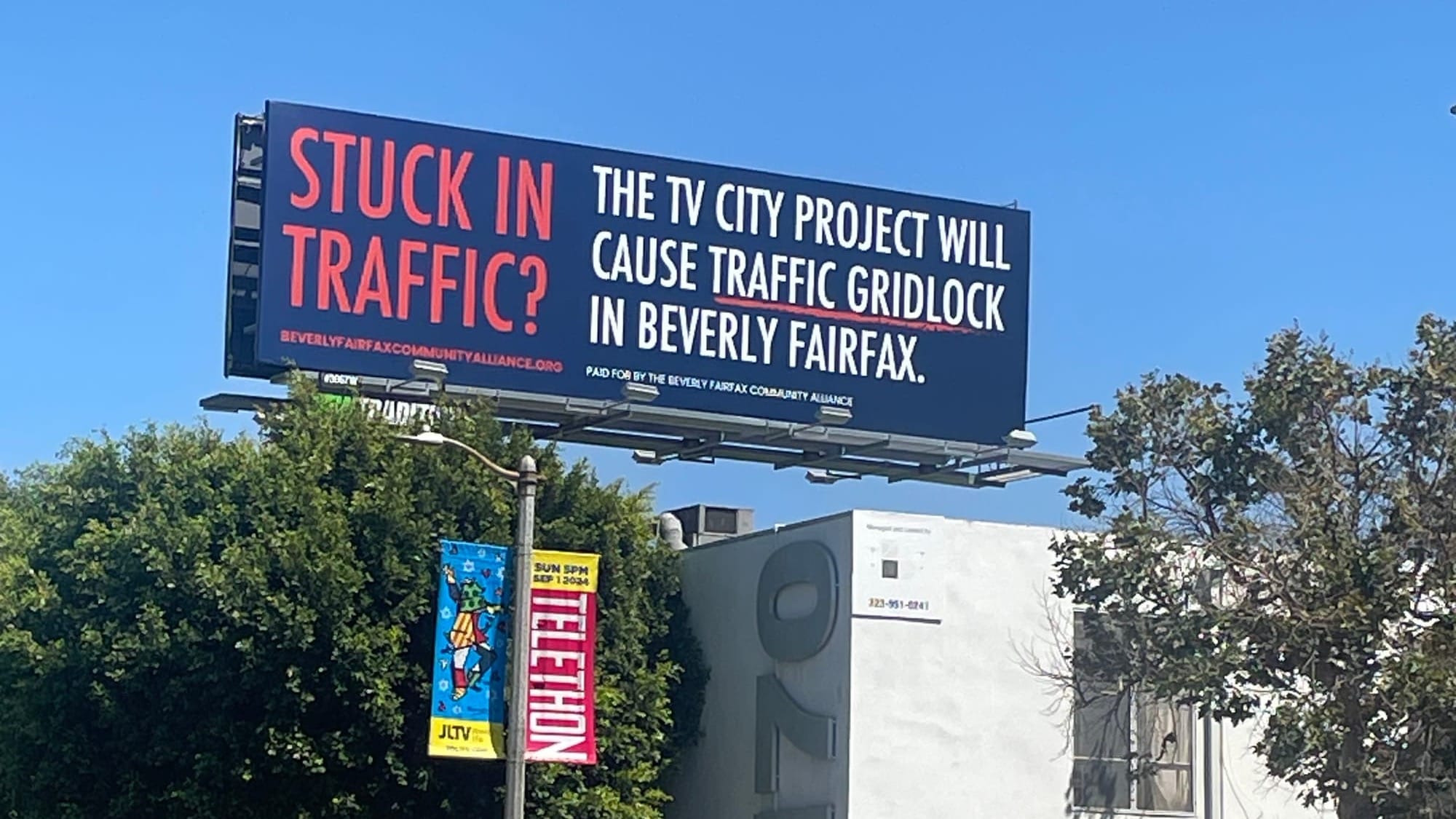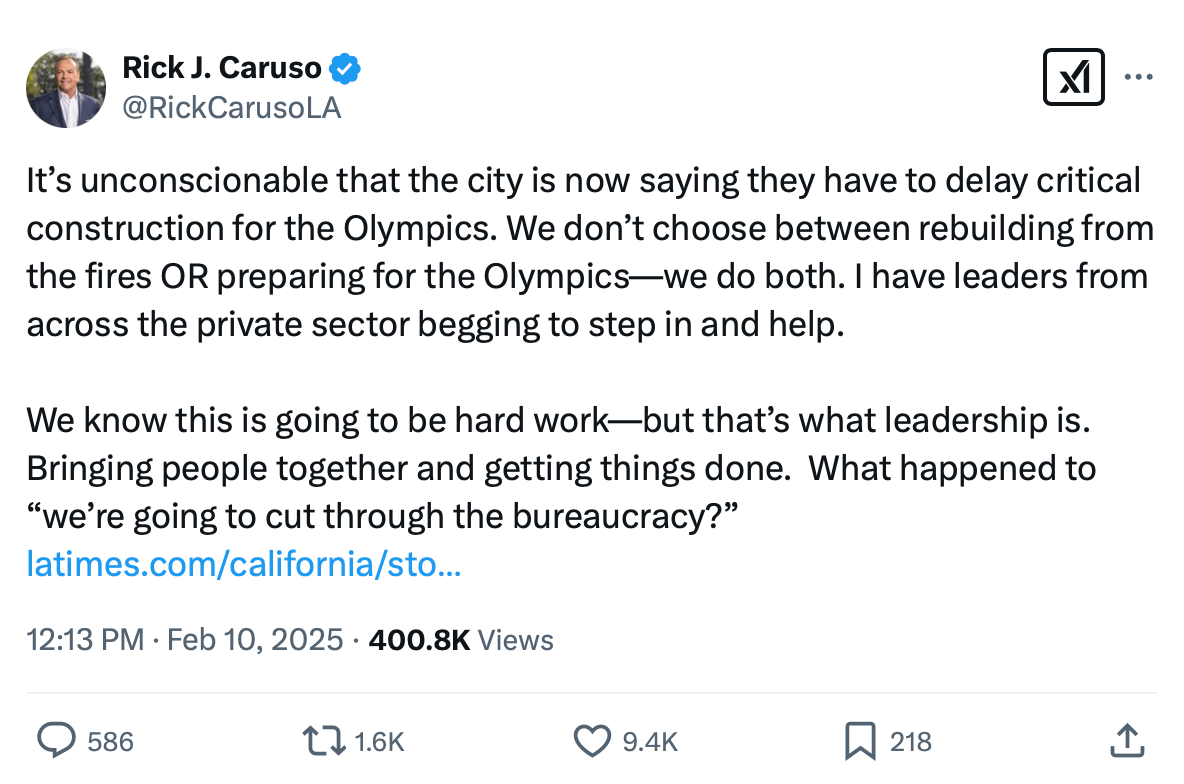The Grand scheme
This is the downtown that Frank Gehry wanted. When will LA's leaders give it to us?
Just two days after Caruso embarked upon a press tour touting his red-tape-slashing plan, his other LA mall sued the city to delay the construction of a major job center right next door

When Rick Caruso launched Steadfast LA, his new nonprofit to rebuild LA after the fires, the billionaire developer of the Palisades Village mall made one major promise: speeding up construction. "We’re here to bypass red tape, drive real solutions, and act with the urgency this moment demands," Caruso wrote on February 5. "We've seen it before — bureaucratic gridlock, outdated processes, and endless delays hurting people who need help now."
But just two days after Caruso embarked upon a press tour touting his red-tape-slashing plan, his other LA mall sued the city to delay the construction of a major job center that could arguably help both the fire-ravaged economy and the struggling entertainment industry to recover — right next door.
On February 7, the Grove filed a 43-page CEQA challenge attempting to stop the redevelopment of the Television City campus adjacent to its property. The $1 billion modernization of the historic 1952 studio was approved by LA's city council as a way to bring more television production back to LA and more life back to the neighborhood. "This campus must be brought into the 21st century," said Councilmember Katy Yaroslavsky, just before the 13-0 vote. "Beverly Fairfax needs this shot in the arm to thrive once more. After years of debate, it’s time to move forward." And it is a move forward, indeed: where the Grove is a monolithic fortress walled off from the streets, the Television City proposal is airy and permeable, its cafes and retail spaces spilling out onto the sidewalks. It's going to make Caruso's property look tired and dated in comparison.

The lawsuit isn't really a surprise — and neither is the hypocrisy. There were plenty of good-faith criticisms of the project, many of which have been addressed through endless revisions; last year, the developer, Hackman, which bought the property in 2018, even brought on a new design team headed by starchitect Norman Foster. But Caruso's companies and their various affiliates have challenged the project since it was proposed. In 2022, the Grove filed a 374-page comment opposing Television City's draft environmental review, even as Caruso, running for mayor, publicly claimed that he supported the project. As Caruso's campaign stance remained staunchly pro-Television City — "I have never opposed a project in my life and I don’t oppose this one" — neighborhoods around the Grove were assaulted by billboards and text messages urging residents to fight the project. These were paid for by the Beverly Fairfax Community Alliance, which is primarily funded by — you guessed it! — the Grove.
While filing a CEQA challenge to stop new development is one of LA's favorite pastimes — Torched readers know exactly how this works — this practice runs counter to Caruso's previous mayoral platform promises. In a 2022 LAist candidate questionnaire, Caruso pledged to "reduce frivolous CEQA challenges that impede sensible development." Then again, Caruso is an expert on weaponizing the CEQA process. He used a CEQA loophole to bypass approvals for a mall he was planning in Carlsbad — which was eventually defeated by residents in a special election.
As I pointed out last week, Caruso's nonprofit was originally reported to be focusing on the Palisades, where his mall is still pumping out showtunes thanks to a private firefighting crew. But when Steadfast LA launched, the area of focus had suddenly expanded to "revitalizing the Altadena, Malibu, Pasadena, and the Pacific Palisades communities." Caruso already seems to be outgrowing that footprint. Within the week, Caruso had further expanded his scope, staking a claim on another big development that serves as an economic engine for the city: LA's convention center in downtown.

Caruso's tweet hits differently a week later — now who's delaying critical construction? — but this wouldn't be the first time that Caruso got involved in building the city's public infrastructure. As a police commissioner in the early 2000s, Caruso leveraged his real estate connections to find LAPD a new home in downtown, eventually championing the construction of a brand-new headquarters. However, as Torched readers know, the convention center does not need to be finished "for" the Olympics. Aside from a plan to deploy flying taxis from his malls, Caruso hasn't talked about the Olympics all that much — although he was on the bid committee — and his sudden interest in getting this infrastructure in place by then isn't simply a power grab. Attacking the floundering planning for 2028 sets up a timeline in which he is elected mayor — or governor — in 2026. Hayes Davenport got into all of it at Big City Heat this week: Caruso hasn't declared, but he's already running.
Putting up a very public challenge to a major studio expansion places candidate Caruso in an extremely awkward position. "LA is one of the largest economies in the world, and when this city takes a hit, the entire country feels it," Caruso wrote in his February 5 mission statement. He was talking about the fires, but the same statement could also apply to the reverberating fiscal impacts when movies and TV shows leave town. In the wake of the fires, the #StayinLA campaign argued that keeping more production local is a powerful engine that could reinvigorate the entire region's economy, from restaurants to retailers. His own mall tenants would benefit! Why is Rick Caruso trying to stop LA's recovery progress? 🔥